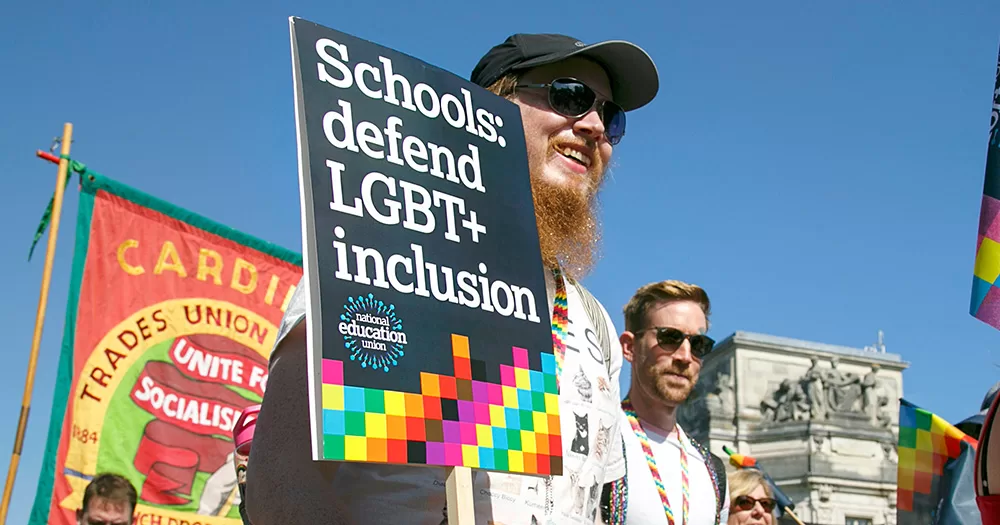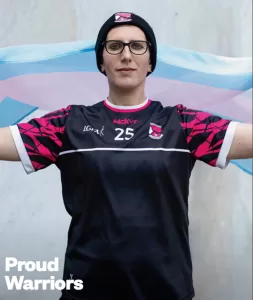While many may think that teachers in our country don’t face discrimination because of their identity, Primary Education Officer at Education Equality, Simon Lewis, shares the reality of LGBTQ+ inclusivity in Irish primary schools.
When Conor Bredin stood up at the Irish National Teachers’ Organisation (INTO) Congress in 2022 to tell the story of how he was sacked from his job as a primary school teacher when he came out to his principal as LGBTQ+, there were gasps from the delegates. Conor only felt comfortable telling his story after securing a job in a multi-denominational school where his sexuality would not be seen to be a “threat” to its ethos.
Until recently, the Employment Equality Act allowed a school’s Board of Management to discipline a member of staff if it could prove that they were undermining their school’s religious ethos. The legislation was amended in 2015 in reforms that were intended to protect LGBTQ+ staff and allow them to feel secure in their employment, whatever their school’s patronage. Five years later, Katie Donohoe nevertheless reported in GCN that 80% of LGBTQ+ teachers were still not out in their school communities “due to fears of it hampering their career prospects”.
Although discrimination on the basis of sexual orientation was now illegal, there was a general consensus that one’s sexuality could still be a problem, particularly in Catholic schools. Why is it that the vast majority of LGBTQ+ staff remain in the shadows? Because Catholic schools account for almost 90% of all primary schools in Ireland, the struggle for LGBTQ+ inclusivity remains a silent and uphill battle, overshadowed by a “Don’t Ask, Don’t Tell” policy.
The INTO works hard to fight for equality for LGBTQ+ teachers.
In the early part of the 2000s, an LGBTQ+ group was founded. For its first number of years of existence, this very small group worked anonymously. When they marched in the Pride festival, they hid their faces, as they feared for their jobs.
Thankfully in recent years, partially thanks to the change in the Employment Equality Act, teachers no longer have to hide their faces and they are joined in the Pride festival by the leaders of the union, dressed in colourful robes. The cheers from the crowds as they pass demonstrate the recognition of their struggles and how out of sync their employers are with 21st-century norms.
Since 2020, the INTO president travels around the country to raise a Pride flag in schools in every county every June. This flag-raising occurs in many denominational schools.
However, while some Catholic schools raise the rainbow flag during Pride month, this gesture alone does not make them inclusive. In fact, critics will claim that it is no longer an act of protest. It is easy to raise a flag. The litmus test lies in the support primary and secondary schools offer to their LGBTQ+ students and the lessons they teach, or perhaps, what they don’t teach.
The INTO’s annual Different Families, Same Love competition serves as a prime example. This competition encourages children to create projects that celebrate diverse families. In its five-year history, denominational schools have been noticeably underrepresented on the winners’ list.
In 2021, none of the winning schools had a religious affiliation, with only two Catholic schools appearing on the 20-strong shortlist. In its entire history, there has never been a winning entry from a school with a religious ethos.
To put this into context, because only 5% of all primary schools do not have a religious ethos, when it comes to competitions in general, mathematically, it is very rare to find these schools on the winners’ lists. 95% of the time, the winner of most competitions has the name of a saint in its title.
The INTO LGBTQ+ group produces and provides a fantastic array of resources for teachers, which can be accessed in a number of places. These include Unveiling our Past: The Struggle for LGBT+ Rights in Ireland, an LGBTQ+ inclusive history teaching resource for fifth and sixth classes, and a number of posters for staff rooms on inclusivity. They are all provided to teachers for free.
It is interesting to note that teachers were at least five times less likely to download a resource specifically about LGBTQ+ issues than they were if the resource was celebrating a person who happened to be a member of the LGBTQ+ community.
This “sin by omission,” to borrow a phrase, also extends to LGBTQ+-friendly content theatre. Take Aunty Ben, a play for primary school children that revolves around nine-year-old Tracey’s relationship with her favourite aunty, Ben.
The blurb continues, “It doesn’t matter to Tracey at all that Aunty Ben is actually her uncle, or that he is a drag queen, because in Tracey’s family dressing up is for everyone! But when Ben meets her school friends, Tracey is shocked to discover that other people’s families can be very different to her own.”
After a successful tour of several festivals in Ireland and abroad, the play was offered to every primary school for free. Not a single denominational school attended the performance, leaving only Educate Together schools to show their support.
However, the exclusion of LGBTQ+ issues goes well beyond simply not turning up at plays or Pride events. The curriculum, as set down by the Department of Education, can be altered by the wishes of the patron body to ensure that their religious values are represented in every single subject. This can be very subtle, and a cursory glance at primary-level textbooks tends to be heavily biased.
For example, there has yet to be an Irish textbook at primary level featuring an LGBTQ+-friendly family. It’s always Mamaí agus Daidí.
However, Relationships and Sexuality Education (RSE) is the most overt example of how the integrated curriculum can exclude LGBTQ+ families.
Catholic schools do not permit their teachers to discuss same-sex marriage. The Irish Catholic Bishops’ Conference that wrote the RSE curriculum were quite explicit on this.
When emphasising the importance of a Catholic morality code when it comes to sex education, they stated: “The teacher will not attempt to build respect for the views of others on the false and fragile base of thinking that it does not much matter what one’s view is, so long as it is sincere.”
With that in mind, they noted that the Church’s teaching in relation to marriage between a man and a woman “cannot be omitted”. Even an updated RSE programme in 2021 stuck rigidly to this position.
In 2021 the Catholic Church decided that it was time for an updated RSE programme. It was called Flourish and was introduced as the new programme for Catholic schools to teach RSE. For anyone who thought it would be much more modern or, at best, more subtle about its dogma, it certainly didn’t turn out that way.
Flourish contains statements like “Puberty is a gift from God” and “We are perfectly designed by God to procreate with him”. In a lesson on safety and protection, the programme advises children to say the “Angel of God” prayer. There is no mention whatsoever of same-sex relationships.
Whether they like it or not, teachers working in Catholic schools are expected to teach these lessons without question, and, mostly, they do. It is so ingrained in the culture of teaching to effectively be missionaries for the Catholic Church, no different to the people you hear going to South America, Africa and Asia converting people to Catholicism. They simply spread the Good News, even if they don’t believe a word of it. The worst thing of all is they do it 182 days a year!
Many do it happily, if not thoughtlessly, because it’s what their teachers did for them when they went to school, and it’s what happened to their parents when they went to school. If they aren’t happy doing it, they do it because of the “Don’t Ask, Don’t Tell” rule because they know that the options aren’t great when 95% of all schools have the same rules.
Given recent referenda over the past decade, it is simply not tenable that the views of most parents (Catholic-identifying and non-Catholic alike) are being represented by this teaching. But there is always hope.
The two biggest teacher-training institutions, Hibernia College and Dublin City University, are no longer patronised by religious orders. The former was never under the remit of a church but, ironically, is the only training college that makes it compulsory for students to study the Catholic Religious Certificate as part of their core programme.
DCU’s story was an amalgamation of two Catholic Colleges and the only Church of Ireland College in the country. St Patrick’s College Drumcondra, the Mater Dei Institute of Education, and the Church of Ireland College of Education (CICE) came together under the umbrella of DCU.
While the university still offers members of the Church of Ireland favourable points in CAO applications and technically offers a separate course for members of the Church of Ireland, on the ground, students attend a course that is not fully permeated by either faith tradition. A walk around the campus of St Patrick’s College will see noticeboards advertising LGBTQ+ support services. In fact, each year, there is a Drag Race event hosted by one of the societies.
Perhaps it’s a sign that the future might be a safer place for all of our teachers.
If we are to continue to have denominational schools, they need to move beyond symbolic gestures and address the underlying issues that hinder LGBTQ+ inclusivity. By challenging the “Don’t Ask, Don’t Tell” culture and embracing a more comprehensive RSE curriculum, these schools can begin to foster a more inclusive environment for all students, regardless of their sexual orientation or relationship status.
We should be raising the roof about it instead of gasping at conferences and symbolically raising flags.
This article on LGBTQ+ inclusion in Irish primary schools originally appeared in Issue 378 of GCN Magazine.
© 2023 GCN (Gay Community News). All rights reserved.
This article was published in the print edition Issue No. 378 (June 1, 2023). Click here to read it now.
Support GCN
GCN is a free, vital resource for Ireland’s LGBTQ+ community since 1988.
GCN is a trading name of National LGBT Federation CLG, a registered charity - Charity Number: 20034580.
GCN relies on the generous support of the community and allies to sustain the crucial work that we do. Producing GCN is costly, and, in an industry which has been hugely impacted by rising costs, we need your support to help sustain and grow this vital resource.
Supporting GCN for as little as €1.99 per month will help us continue our work as Ireland’s free, independent LGBTQ+ media.

